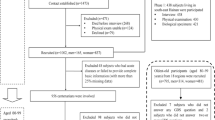Abstract
Objective
Since 1996, older patients have been treated in the Nuremberg Geriatric Day Hospital. The geriatric depression scale (GDS) is an obligatory part of the geriatric assessment at admission but its use in the clinical setting has revealed some problems. The aim of the study was to compare the GDS with the depression in old age scale (DIA-S) in terms of applicability and psychometric characteristics.
Methods
As gold standard a semi-structured interview was used to record the depression criteria according to Diagnostic and Statistical Manual of Mental Disorders (DSM-5). Using a sample of 375 patients, sensitivity and specificity as well as positive and negative predictive values were calculated for both screening tests.
Results
No clear superiority of any screening method could be proven. The sensitivity of the DIA‑S in the overall sample was higher than that of the GDS, but the specificity was much lower. In terms of predictive values, there were slight advantages for the GDS. In the sub-samples, poorer values were found in both scales for cognitively impaired or dementia patients with slightly better values for GDS.
Conclusion
The DIA‑S can be used very easily in everyday clinical practice, but no advantages of this method compared to GDS could be demonstrated.
Zusammenfassung
Zielsetzung
Seit 1996 werden ältere Patienten in der Geriatrischen Tagesklinik Nürnberg behandelt. Die geriatrische Depressionsskala (GDS) ist ein obligatorischer Bestandteil des geriatrischen Assessments bei der Aufnahme, aber ihre Anwendung im klinischen Setting hat einige Probleme offenbart. Ziel der Studie war es, die GDS mit der Depression im Alter-Skala (DIA-S) in Bezug auf Anwendbarkeit und psychometrische Eigenschaften zu vergleichen.
Methoden
Als Goldstandard wurde ein semistrukturiertes Interview zur Erfassung der Depressionskriterien nach „Diagnostic and Statistical Manual of Mental Disorders” (DSM-5) verwendet. Anhand einer Stichprobe von N = 375 Patienten wurden Sensitivität und Spezifität sowie positive und negative Vorhersagewerte für beide Screening-Tests berechnet.
Ergebnisse
Es konnte keine eindeutige Überlegenheit einer Screening-Methode nachgewiesen werden. Die Sensitivität der DIA‑S ist in der Gesamtstichprobe höher als die der GDS, die Spezifität ist jedoch deutlich geringer. In Bezug auf die prädiktiven Werte ergaben sich leichte Vorteile für das GDS. In den Teilstichproben fanden sich in beiden Skalen schlechtere Werte für kognitiv eingeschränkte oder demente Patienten mit leicht besseren Werten für die GDS.
Schlussfolgerung
Die DIA‑S ist im klinischen Alltag sehr gut anwendbar, es konnten jedoch keine Vorteile dieses Verfahrens gegenüber der GDS nachgewiesen werden.

Similar content being viewed by others
References
Andreas S, Schulz H, Volkert J, Dehoust M, Sehner S, Suling A, Ausín B, Canuto A, Crawford M, Da Ronch C, Grassi L, Hershkovitz Y, Muñoz M, Quirk A, Rotenstein O, Santos-Olmo AB, Shalev A, Strehle J, Weber K, Wegscheider K, Wittchen HU, Härter M (2017) Prevalence of mental disorders in elderly people: the European MentDis_ICF65+ study. Br J Psychiatry 210(2):125–131
Fiske A, Wetherell JL, Gatz M (2009) Depression in older adults. Annu Rev Clin Psychol 5:363–389
Schaakxs R, Comijs H, Lamers F, Beekman A, Penninx B (2017) Age-related variability in the presentation of symptoms of major depressive disorder. Psychol Med 47(3):543–552
Braam AW, Prince MJ, Beekman AT, Delespaul P, Dewey ME, Geerlings SW, Kivela SL, Lawlor BA, Magnusson H, Meller I, Pérès K, Reischies FM, Roelands M, Schoevers RA, Saz P, Skoog I, Turrina C, Versporten A, Copelan JR (2005) Physical health and depressive symptoms in older Europeans. Results from EURODEP. Br J Psychiatry 187:35–42
Read JR, Sharpe L, Modini M, Dear BF (2017) Multimorbidity and depression: a systematic review and meta-analysis. J Affect Disord 221:36–46
Kok RM, Reynolds CF (2017) Management of depression in older adults: a review. JAMA 317(20):2114–2122
Yesavage JA, Brink TL, Rose TL, Lum O, Huang V, Adey M, Leirer VO (1982) Development and validation of a geriatric depression screening scale: a preliminary report. J Psychiatr Res 17(1):37–49
Arbeitsgemeinschaft der Wissenschaftlichen Medizinischen Fachgesellschaften (2019) S1-Leitlinie „Geriatrisches Assessment der Stufe 2. https://www.awmf.org/leitlinien/detail/ll/084-002.html. Accessed: 17.02.2021
Heidenblut S, Zank S (2014) Screening for depression with the depression in old age scale (DIA-S) and the geriatric depression scale (GDS15). GeroPsych 27:41–49
Heidenblut S, Zank S (2010) Entwicklung eines neuen Depressionsscreenings für den Einsatz in der Geriatrie. Die „Depression-im-Alter-Skala“ (DIA-S). Z Gerontol Geriatr 43(3):170–176
Montgomery SA, Asberg M (1979) A new depression scale designed to be sensitive to change. Br J Psychiatry 134:382–389
Yesavage JA, Sheikh JI (1986) Geriatric depression scale (GDS): recent evidence and development of a shorter version. Clin Gerontol 5:165–173
Pocklington C, Gilbody S, Manea L, McMillan D (2016) The diagnostic accuracy of brief versions of the geriatric depression scale: a systematic review and meta-analysis. Int J Geriatr Psychiatry 31(8):837–857
Boehlen FH, Freigofas J, Herzog W, Meid AD, Saum KU, Schoettker B, Brenner H, Haefeli WE, Wild B (2019) Evidence for underuse and overuse of antidepressants in older adults: results of a large population-based study. Int J Geriatr Psychiatry 34(4):539–547
Walker J, Burke K, Wanat M, Fisher R, Fielding J, Mulick A, Puntis S, Sharpe J, Degli Esposti M, Harriss E, Frost C, Sharpe M (2018) The prevalence of depression in general hospital inpatients: a systematic review and meta-analysis of interview-based studies. Psychol Med 48(14):2285–2298
Author information
Authors and Affiliations
Corresponding author
Ethics declarations
Conflict of interest
C. Wunner, M. Stemmler, J. Masuch, M. Gosch, C. Waller and K. Singler declare that they have no competing interests regarding the submitted manuscript and the reported study.
Ethical standards
All procedures performed in studies involving human participants or on human tissue were in accordance with the 1975 Helsinki declaration and its later amendments or comparable ethical standards. Informed consent was obtained from all individual participants included in the study. The study was approved by the local institutional review board and the ethics committee (Freiburger Ethikkomission International, Nr. 017/1504). Data acquisition was co-financed by the Staedtler-Stiftung, Nuremberg.
Additional information

Scan QR code & read article online
Rights and permissions
About this article
Cite this article
Wunner, C., Stemmler, M., Masuch, J. et al. Screening for depression in old age. Z Gerontol Geriat 55, 44–50 (2022). https://doi.org/10.1007/s00391-021-01949-w
Received:
Accepted:
Published:
Issue Date:
DOI: https://doi.org/10.1007/s00391-021-01949-w



